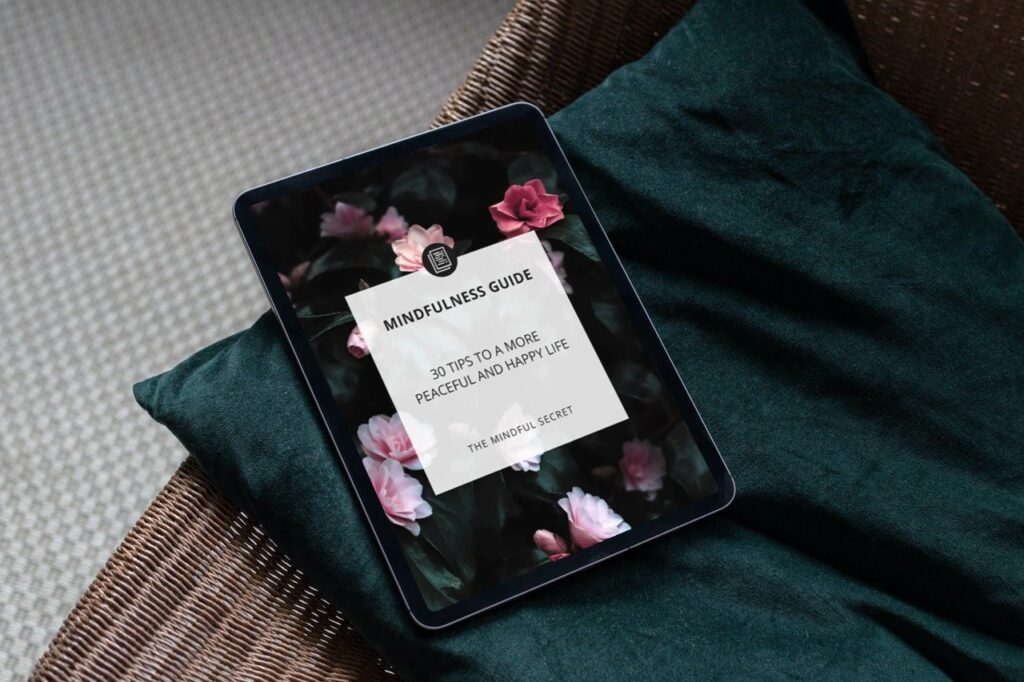How Mindfulness Helps Improve Your Life
It’s no secret that mindfulness can help reduce stress and anxiety. But what a lot of people don’t know is that mindfulness also has a host of other benefits, including improved brain function and emotional well-being. Instead of letting your life pass you by, mindfulness means living in the moment and awakening to experience. In this blog post we’ll take a closer look at some of the ways how mindfulness helps improve your life.
What Mindfulness Is And It’s Benefits
It’s important to note that there is no single definition of mindfulness. But it’s a technique and a practice that encourages you to be fully aware and engaged in the present moment. It is a state of active, open attention on the present without judgment or need for change.
Mindfulness can not only help reduce stress and anxiety, but also improve brain function and emotional well-being. It has also been linked with better immune function, greater working memory capacity (the ability to hold information in the mind), and increased focus and creativity. Let’s take a look at the many ways how mindfulness helps us live better lives.

How Mindfulness Helps
Live in the moment
Being mindful encourages living in the present, rather than dwelling on the past or daydreaming about the future. It allows you to appreciate life as it is right now and not merely as we want it to be. We all know what happens when we try to push away unpleasant thoughts and feelings: they come back stronger than ever.
Mindfulness encourages us to observe our thoughts and feelings as we would watch clouds passing in the sky: not judging, just watching. When we aren’t lost in our thoughts or emotions, we’ll be able to better handle problems as they arise. Without reacting too quickly or shutting down emotionally.
Understand your emotions
Mindfulness can help you achieve better emotional balance by allowing us to understand our emotions and feelings. It teaches us to recognize that sometimes unpleasant thoughts and feelings are just a part of being human. Rather than being an indication that something is wrong with us or someone else. When we can accept and acknowledge our emotions without necessarily acting on them, it allows us to make more rational decisions.
When we are mindful, we become aware of how changing situations trigger different emotions in us. For example, your work colleagues may annoy you because they always ask you for help when you’re busy with other things. When this happens, mindfulness teaches us to recognize that our emotional reaction isn’t based on anything real. It’s just a result of the situation triggering an old memory of being overworked and taken for granted. Having this awareness means we can respond more calmly and reasonably.
Cope better with difficult thoughts
Mindfulness encourages acceptance and awareness of our thoughts, rather than being led by them or trying to suppress them. Mindfulness helps us to be more compassionate with ourselves when we experience unpleasant thoughts and feelings. This means you don’t take negative thoughts so seriously, which makes them much easier to manage.
For example, if you’re having a bad day and are feeling down, mindfulness will help you realize this is only temporary and that the feeling will pass if you just allow it to run its course. Mindfulness can also teach us to be more aware of the mental habits that contribute to depression, stress and unhappiness, such as over-thinking or catastrophizing (expecting disaster). It can also help us recognize when we are being overly critical of ourselves.
Feel calmer and more focused
By focusing on the present moment, you can better stay calm in stressful situations that could tend to trigger anxiety or a panic attack. Mindfulness teaches us to stand back and watch our thoughts, rather than believing everything we think.
It’s impossible to live life completely free from stress and worry – everyone gets stressed. But there are certainly things we can do to minimize the stress we experience, such as not resisting what life brings and instead learning to accept it. This way you will be able to focus on what matters to you right now instead of getting distracted by things that trigger your stress and anxiety.
A very helpful audio program in this regard is Room to Breathe by Sharon Salzberg. Here she presents eight essential guided practices along with mindfulness teachings. Including ‘Calming the Mind’ – a technique to help replace stress and anxiety with calm composure and strength.
Reduce worry and regrets
Instead of worrying about the future or regretting the past, mindfulness encourages us to be more aware of our thoughts and emotions in the present moment. The human brain is always looking for patterns and meaning where they may or may not exist. This means we sometimes give random events too much importance and worry about the worst possible outcomes. When you are mindful, you can recognize that it’s impossible to be sure about many things, so there’s no point wasting time worrying about them.
Mindfulness can also help us stop regretting things so much. We can learn to see that our past actions are done and over with, so there’s no point in dwelling on them or feeling guilty about them anymore.
Improve sleep

Mindfulness teaches us to be aware of how thoughts and emotions affect our bodies. It’s common for people who are stressed or anxious to also have sleeping problems. Mindfulness practices can help you relax so it becomes easier to fall asleep, so you’ll wake up feeling more refreshed in the morning.
Sleeping on a regular schedule is more important for sleep quality than the number of hours you sleep. Making sure you get up at about the same time everyday can help regulate your body’s natural rhythm.
Reduce the symptoms of anxiety and depression
Mindfulness is a useful tool for managing symptoms of anxiety and depression because it encourages you to stop dwelling on the past and worrying about the future. It can also help people who have been depressed several times to stay well and avoid relapsing. Mindfulness helps you notice when you are being self-critical, which is a common mental habit that can contribute to anxiety and depression. By noticing this kind of thinking, mindfulness teaches us to be more compassionate towards ourselves.
You can use mindfulness to try to look at situations and thoughts from different perspectives. Examine their importance, and if they’re actually true, rather than believing your fears as facts. This can lead to feeling more calm and accepting of what is.
Improve physical health
Stress has a huge impact on our bodies. Mindfulness can help you manage stress so it doesn’t affect your health as much. Stress can cause everything from headaches, muscle tension, insomnia, to even heart problems. Using mindfulness to improve your health and reduce stress can even help lower blood pressure, reduce chronic pain, improve sleep, and strengthen your immune system.
Being mindful can help you take control of your health because it helps you look at things differently and make better choices. For example, if you are suddenly hungry for comfort food during stressful times, mindfulness can teach you to slow down and think about what’s best for your body instead of just reacting to your cravings and emotions.
You’ll be better able to pay attention to the signs your body gives you, so you’ll know when to change something. Practicing mindfulness regularly can help you look after your health more efficiently and feel great too.
Improve your relationships and connections with others

Mindfulness encourages acceptance and patience with yourself and others without judgment or criticism. When we are more accepting of ourselves, it becomes easier to be compassionate and patient with others.
When our attention is not on the present moment, we’re more likely to end up judging people and comparing them against previous events and other people in our memories. With mindfulness, we can recognize more easily that even if someone is acting negatively towards us, it doesn’t mean that they’re a bad person or that there’s something wrong with them. In these situations, mindfulness teaches us to be patient and compassionate. For instance, we can realize that they may be hurting emotionally themselves, or maybe they’re just having a bad day.
When you’re more mindful, it’s easier to forgive others, and to be understanding of them. This is because mindfulness encourages empathy by helping us to put ourselves in other people’s shoes. It will also make it easier to ask for forgiveness from others, if you need to.
Mindful awareness can help us become less judgmental and more compassionate, because we won’t be so caught up in emotions. It allows you to have better connections with people, because you’ll worry less about what someone else might think or if they like you. This can lead to having better relationships and connections with other people.
Conclusion – How Mindfulness Helps Improve Your Life
Mindfulness teaches us the importance of being in touch with our thoughts and feelings. It helps us understand them, instead of letting them overwhelm us. You don’t have to be a meditation guru to practice mindfulness. You can train yourself to be mindful as you go about your daily life. Just focus on what you’re doing without thinking of anything else.
When you’re mindful it’s easier to be in the here and now. This can be quite a refreshing experience if we tend to spend our lives worrying about the past or trying to predict the future. Mindfulness helps you feel more at peace with yourself because it shows you how much time you’ve wasted getting upset about things that have already happened. Instead it enables us to better enjoy the happiness that’s available right here and now.
We all have problems arise in our lives, but mindfulness can help us manage them better. It helps us pay attention in our daily lives so we’re able to respond in a healthy way. Instead of just reacting automatically without thinking about what’s best for us. Mindfulness is a rewarding practice that can help you in all areas of your life.
A great way to learn how to benefit from using mindfulness techniques is Mindfulness for Beginners by Jon Kabat-Zinn. In this audio program with a master teacher, you can follow guided meditations and learn the Seven Key Factors that lead into the essence of Mindfulness-Based Stress Reduction (MBSR). Discover qualities that lay the foundation for mindfulness practice and for working wisely and compassionately with stress, pain, illness, and sorrow, as well as life’s joys and pleasures.
It’s amazing how much we miss when we forget to look around us! Mindfulness helps you notice the little things in life that are important. You may need to take some time out to learn about mindfulness, but it’s worth taking this time because it will make a huge difference when you find ways to practice mindfulness for yourself.

Get Our Mindfulness Guide For Free
“30 Tips To A More Peaceful And Happy Life”
Do you find yourself living in the past or worrying about the future?
Do you ever feel like there is just too much going on and not enough time to take care of what really matters?
If so, mindfulness exercises can help! Mindfulness exercises are a great way to practice living in the moment and become more peaceful. They can even help with stress relief.
This guide will provide you with 30 of the best mindfulness tips and exercises that anyone can do.
When signing up you will also receive our free email newsletter with mindfulness tips, motivational content, and resources. You can unsubscribe at any time. We value privacy and will always protect your email.







